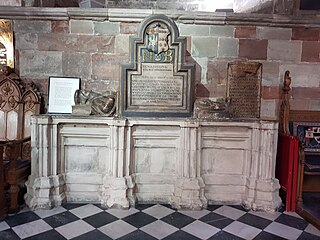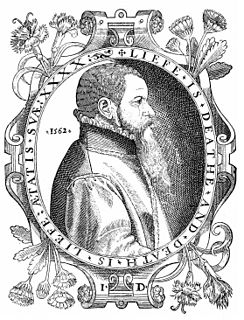Life
A native of Warwickshire, Bull was a demy of Magdalen College, Oxford, in 1535, and full fellow and B.A. in 1540. He was a prominent reformer in the college, in a group that included Thomas Cooper, Robert Crowley and John Foxe. He became rector of Courtenhall in early 1553. [1] [2]
When Mary I of England came to the throne later in 1553, Bull, with the help of Thomas Bentham, snatched a censer from the hand of the officiating priest and was expelled from Magdalen. A visitation of the college was held and, on 23 October 1553, the visitors deprived Bull of his fellowship. Anthony Wood says that he went into exile, which cannot be documented, but Strype states that he lived quietly at home as a Protestant. [1] [2]
After the accession of Elizabeth I of England, Bull held benefices, according to Wood. He collected correspondence and manuscripts, that were kept by Emmanuel College, Cambridge, and worked in parallel with Foxe's Actes and Monuments . [1] [2]
Works
Bull edited the Apology of Bishop John Hooper (1562) and, in the same year, Hooper's Exposition of Psalm xxiii. Other commentaries of Hooper's on three psalms appeared in Certeine comfortable Expositions of … Master John Hooper on Psalms 23, 62, 72, 77, gathered by Mr. H. B. (1580). He was also the editor of Christian Praiers and Holy Meditacions which appeared first by 1570; an earlier work from Bull's collection was Lidley's Prayers (1566). Christian Praiers was reprinted later in the century, and by the Parker Society. [2]
The major martyrological collection, Certain Most Godly, Fruitful and Comfortable Letters of such True Saintes and Holy Martyrs as in the Late Bloodye Persecution Gave their Lyves, was published in 1564, as by Miles Coverdale. In effect, it was by Bull. [3]
Bull translated from Martin Luther A Commentarie on the Fiftene Psalmes called Psalmi Graduum, printed by Thomas Vautroullier (1577), with a preface by Foxe. [2]

Myles Coverdale, first name also spelt Miles, was an English ecclesiastical reformer chiefly known as a Bible translator, preacher and, briefly, Bishop of Exeter (1551–1553). In 1535, Coverdale produced the first complete printed translation of the Bible into English. His theological development is a paradigm of the progress of the English Reformation from 1530 to 1552. By the time of his death, he had transitioned into an early Puritan, affiliated to Calvin, yet still advocating the teachings of Augustine.

John Foxe, an English historian and martyrologist, was the author of Actes and Monuments, telling of Christian martyrs throughout Western history, but particularly the sufferings of English Protestants and proto-Protestants from the 14th century and in the reign of Mary I. The book was widely owned and read by English Puritans and helped to mould British opinion on the Catholic Church for several centuries.

Nicholas Bullingham was an English Bishop of Worcester.

John Day was an English Protestant printer. He specialised in printing and distributing Protestant literature and pamphlets, and produced many small-format religious books, such as ABCs, sermons, and translations of psalms. He found fame, however, as the publisher of John Foxe's Actes and Monuments, also known as the Book of Martyrs, the largest and most technologically accomplished book printed in sixteenth-century England.

Jan Utenhove was a writer from the Low Countries best known for his translations into the Dutch language of the Psalms and the New Testament.
James Brooks D.D. was an English Catholic bishop.
Sir Henry Neville of Billingbear House, Berkshire, was a Gentleman of the Privy Chamber to King Henry VIII.
Thomas Bentham (1513/14–1579) was a scholar and a Protestant minister. One of the Marian exiles, he returned to England to minister to an underground congregation in London. He was made the first Elizabethan bishop of Coventry and Lichfield, serving from 1560 until his death in 1579.
John Fowler was a Catholic scholar and printer.
Anthony Draycot was an English Roman Catholic churchman and lawyer. During the reign of Queen Mary he held a diocesan position as chancellor; his role in condemning numerous Protestants to death is detailed in Foxe's Book of Martyrs.
Francis Walsingham was an English Jesuit priest, who assumed the name John Fennell.
The Octagon Chapel, Liverpool, was a nonconformist church in Liverpool, England, opened in 1763. It was founded by local congregations, those of Benn's Garden and Kaye Street chapels. The aim was to use a non-sectarian liturgy; Thomas Bentley was a major figure in founding the chapel, and had a hand in the liturgy.
Bartholomew Traheron (1510?–1558?) was an English Protestant writer and Marian exile.
Edward William Grinfield (1785–1864) was an English biblical scholar.
Dorothy Kitson later, Dorothy, Lady Pakington, was the daughter of Sir Thomas Kitson, a wealthy London merchant and the builder of Hengrave Hall in Suffolk. Her first husband was Sir Thomas Pakington, by whom she was the mother of Queen Elizabeth I's favourite, Sir John "Lusty" Pakington. After Sir Thomas Pakington's death she married Thomas Tasburgh. She was one of the few women in Tudor England to nominate burgesses to Parliament and to make her last will while her husband, Thomas Tasburgh, was still living. Her three nieces are referred to in the poems of Edmund Spenser.
Robert Pakington was a London merchant and Member of Parliament. He was murdered with a handgun in London in 1536, likely the first such killing in the city. His murder was later interpreted as martyrdom, and recounted in John Foxe's Acts and Monuments. He was the grandfather of Queen Elizabeth I's favourite, Sir John "Lusty" Pakington.
Joan or Jane Wilkinson (d.1556) was silkwoman to Anne Boleyn and Lady Lisle and a Protestant reformer. She was a friend of other leading reformers, including Bishops John Hooper and Hugh Latimer. During the reign of Mary I, she became a religious exile, and died at Frankfurt in 1556.
Rose Lok was an English businesswoman and Protestant exile during the Tudor period. At the age of eighty-four, she wrote an account covering the first part of her life.
John Mullins or Molyns was an English churchman and Marian exile, archdeacon of London from 1559.
This page is based on this
Wikipedia article Text is available under the
CC BY-SA 4.0 license; additional terms may apply.
Images, videos and audio are available under their respective licenses.
![]() This article incorporates text from a publication now in the public domain : Stephen, Leslie, ed. (1886). "Bull, Henry". Dictionary of National Biography . 7. London: Smith, Elder & Co.
This article incorporates text from a publication now in the public domain : Stephen, Leslie, ed. (1886). "Bull, Henry". Dictionary of National Biography . 7. London: Smith, Elder & Co.



